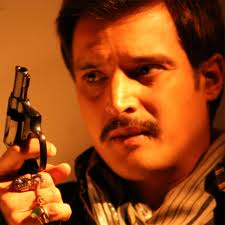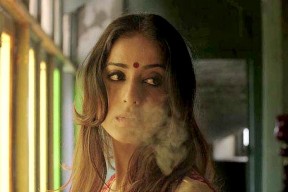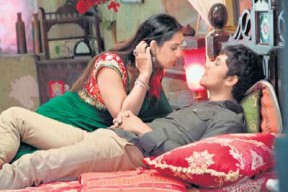Just a moment please. All those who are condescendingly comparing Tigmanshu Dhulia’s Saheb Biwi Aur Gangster with Vishal Bhardwaj’s Maqbool would do well to remember Dhulia’s 2003 film Haasil, the precursor to most of the UP heartland stories we have heard subsequently. There was a rikshaw and cycle borne love story in a quirky small town and a local goon played heart stoppingly by Irrfan Khan in a breakthrough performance. Dhulia did not borrow the template of local mahabalis and political villains and of innocents caught in the gun fire from Vishal Bhardwaj because Maqbool only came in 2004.
Having already seen him toying with the darkness of violence, with unreasonable men played by actors who are not mainstream and yet reek of the kind of truth we don’t see often in Hindi cinema, his Saheb Biwi Aur Gangster is exactly the kind of film we would expect from him and not from a Bhardwaj wannabe. And lets not even bring Anurag Kashyap’s Gulaal to compare with this film. It came years after Dhulia’s Haasil.
Interestingly Jimmy Shergill who was the face of innocence in Haasil, plays the taciturn local Sahib here, a fading figurehead of a lost kingdom and you know right from the first scene that this is an actor with vastly underused resources. Someone with a centre of solid self-assurance. Shergill is one of those rare actors who are never in a hurry to steal scenes. They do not strut or scatter their body language or ham arrogantly to hide their insecurity before the camera. They just act and that is why, be it Maachis or Yahaan or Haasil or Tanu Weds Manu, you always remember the characters Shergill has played.
Here too he is someone eminently watchable and not just because his carriage and his presence is steeped in a kind of inbred arrogance or because he looks fetching even when he is sitting on his dining table, elegantly eating his breakfast. We watch him because he inhabits every scene with conviction whether he is shoving his desperate wife out of the way with gentle ruthlessness or browbeating a politician in his own office or demeaning himself before his step mother.
In a world where the centre of power has shifted from local rulers to politicians, he is now trying to cling to what is left of his glory by interfering with the nexus between industrialists, politicians and criminals. He is also a little bit of all of the above, freely using violence to get what he can’t via a conversation or two.
There is Randeep Hooda, someone who was touted as the next big thing and deservedly so after D Company but then lost his way. Here he shifts from his role as a pawn to a player without missing a beat, bringing every little twitch of lust and anger and desperation to life in a seamless performance.
And then there is Mahie Gill, fast becoming the queen of dysfunction in Hindi films as she undulates on her bed in antique sarees and seduces Hooda’s Babloo with her hysteria and her hunger for validation. Unapologetically sensual and always in sync with her Choti Rani, she navigates her course first as a victim and then as a game changer with barely contained fire.
Deepal Shaw, plays another version of Saheb Bibi Aur Ghulam’s innocent, chatty Jaba (Waheeda Rehman stealing every scene she is in) and shows us she can be an actor, and a very good one if she is allowed to.
That said, the film’s motiff borrowed from Abrar Alvi’s atmospheric and deeply brooding masterpiece, does not really internalise the story of a crumbling personal empire or plumb the minds of the deeply troubled protagonists. It is about the politics that takes us on routine trips to jungles, crowded bazaars and highways and lanes where bullets are pumped into enemies, scores are settled swiftly, cold-bloodedly and an ill-maintained haveli is used only to show us that a marriage has become dysfunctional beyond repair. There are multiple shots of the jaunty Saheb leaving his wife for the night to meet another woman.
Alvi’s film was a comment on the last gasps of Zamindari and even though the camera conspiratorially went into the inner recesses of magnificently detailed havelis and picked on men who spent their lives twirling their moustaches, racing their pigeons and getting drunk in night-long dance orgies of wastefulness, it also travelled into the tormented heart of a woman destroyed by loneliness. It also captured the innocence of the witnesses who are forced to watch the ruins of her life and indirectly become involved in machinations that end in a tragedy.
Here, there are no innocents, maybe except Deepal Shaw’s Suman who foresees the end of the story far before we do. Everyone else is eroded by ambition, by the need for one form of power or another. It becomes clear in the end also whether the young neglected wife wanted just her husband or the sense of power that came from having him all to herself. And if the lover wanted her for the woman she is or for what she represents. There are moments when the lines crackle, the dialogue leaps at you.The actors, including the ones in the ensemble are all engaging, unfailingly. What doesn’t get engaged however is your empathy for any of the characters. The music does not fall easily into the grooves of the story, even though the item number captures the extent of tastelessness that a private gathering of kingpins and their cronies would revel in.
The role of the police is also undefined as bodies pile up and seemingly disappear into thin air with no one being held accountable. The unending gun fights also get tiresome after a while but just for the passion Dhulia invests in the story and the conversations between the characters, this one is worth the price of a ticket.
Reema Moudgil is the author of Perfect Eight (http://www.flipkart.com/b/books/perfect-eight-reema-moudgil-book-9380032870?affid=unboxedwri )









looking forward to watching the film! 🙂
also, jimmy shergill did quite well in ‘a wednesday’ apart from the other films you have mentioned here. thanks for the wonderful review.
Love the review. Just watched the movie and agree with every bit of what you say in this review. Fabulous performances by all actors in this character-driven drama.